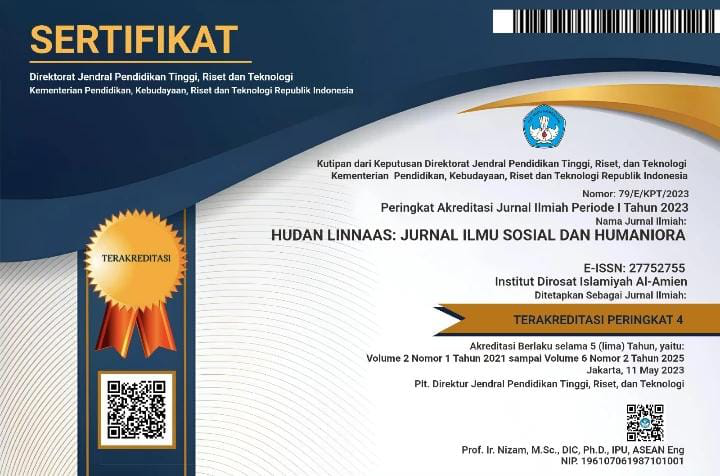LIVING HADIS: KONTRUKSI SOSIAL NILAI-NILAI TAHĀDŪ TAHĀBŪ DALAM TRADISI TONGEBAN
Abstract
Keywords
References
Afandi, A.khozin. (2011). Langkah Praktis Merancang Proposal. Surabaya: Pustakamas.
Al-‘Asqalani, Ahmad bin Ali bin Hajar. (1379). Fath Al-Bari, Juz 5. Bairut: Dar Al-Ma’rifah.
Al-Bukhari, Muhammad bin Isma’il. (1422). Shahih Al-Bukhari,Juz 3. t.t: Dar Thauq Al-Najat,
Al-Ju’fi, Muhammad bin Ismail Al-Bukhari. (1987). Al-Jami’ Al-Shahih Al-Mukhtasar, Juz 5. Bairut: Dar Ibn Katsir.
Al-Mawardi. (1999). Al-Hawi Al-Kabir, Juz 7. Bairut: Dar Al-Kutub Al-Ilmiyah.
Al-Naisyaburi, Abu Abdllah Al-Hakim. (1990). Al-Mustadrak Al Al-Shahihain, Juz 2. Bairut: Dar Al-Kutub Al-Ilmiyah.
Al-Sabuki, Mahmud Muhammad Khattab. (1351). Al-Manhl Al-Adzb Al-Maurud Syarh Sunan Abi Daud, Juz 6. Kairo: Mathba’ah Al-Istiqamah.
Al-San’ani (2011). Al-Tanwir Syarh Al-Jami’ Al-Shawir, Juz 5. Riyad: Maktabah Dar Al-Salam.
Al-Syaibani, Ahmad bin Muhammad bin Hanbal. (2001). Musnad Al-Imam Ahmad Bin Hanbal, Juz 26. t.tp: Muassasah Al-Risalah.
Buhari, Mohamad. (1988). Al-ADab Al-Mufrod. Bairut: Daarul Basyair Al-Islamiyah.
———. (1422). Sohih Buhori, Juz 3. t.t: Daarut Touq Annajat.
Hadiati, N. (2006). “Tata Cara Pelaksanaan Lamaran Dalam Upacara Pengantin Tradisi Jawa Di Surakarta.†Gelar: Jurnal Seni Budaya,. http:// jurnal.isi-ska.ac.id/index. php /gelar /article /view/1219.
Hidayatulloh, haris.Maisih. (2019). “Tinjauan Hukum Islam Terhadap Tradisi Pamoghi Dalam Resepsi Perkawinan ( Studi Kasus Di Desa Kembang Kecamatan Tlogosari Kabupaten Bondowoso ) Volume, 4, no. April: 1–29.
Lasin, Musa Sahin. (2002). Fathul Mun’im, Juz 5. t.t: Daarussyuruq.
Moelong, Lexy. (2013). Metodologi Penelitian Kualitatif. Bandung: PT Remja Rosda Karya.
Permatasari, Afika Fitria, and Mahendra Wijaya. (2018). “Perubahan Perilaku Masyarakat Jawa Dalam Penyelenggaraan Resepsi Pernikahan Di Kota Surakarta.†Jurnal Analisa Sosiologi 6, no. 1.
Romli, Romli, and Eka Sakti Habibullah. (2018). “Telaah Resepsi Pernikahan Adat Jawa Dalam Perspektif Hukum Islam.†Al-Mashlahah: Jurnal Hukum Islam dan Pranata Sosial 6, no. 02: 177.
Suryandari, Nikmah, Netty Dyah Kurniasari, and Rose Dian J. (2019). “Makna Simbol Tradisi Jhe҃҃҃҃҃҃҃҃҃ng Mantoh (Analisa Semiotika Charles Sanders Peirce.†SEMIOTIKA: Jurnal Komunikasi 13, no. 1: 124–132.
Surydilaga, M. Alfatik. (2007). Model-Model Living Hadis Dalam Buku Metodologi Penelitian Living Qur’an Dan Hadis. Yogyakarta: Sukses Offset.
Wardi, Moh. (2013). “Tradisi Ter-Ater Dan Dampak Ekonomi Bagi Masyarakat Madura.†Karsa 21, no. 1: 41–57.
Widhana, M F. (2021). “Konstruksi Nilai-Nilai Sosial Dalam Pernikahan Arab-Bugis Di Kab. Pinrangâ€. http://repository. iainpare .ac.id/2631/%0A http:// repository. iainpare .ac.id /2631/1/18.0221.007.pdf.
DOI: 10.28944/hudanlinnaas.v4i2.1313
Refbacks
- There are currently no refbacks.

This work is licensed under a Creative Commons Attribution-NonCommercial-ShareAlike 4.0 International License.







.png)